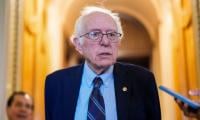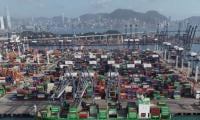Thai police fire rubber bullets, tear gas during Bangkok protest; Berlin to end free Covid tests to boost vaccinations
Berlin: Germany will end free coronavirus tests in October, regional leaders and the federal government agreed on Tuesday, in a push to incentivise more people to get vaccinated.
Covid-19 tests or proof of vaccination or recovery will be required to access facilities including restaurants, cinemas and gyms, in areas where infection rates rise above a certain threshold. From October those who refuse to get jabbed will have to pay to prove they are infection-free, or risk being shut out.
Proof of test or vaccination will be required as soon as the rate of infections in a region reaches 35 per 100,000 people over seven days. Children and people who for health reasons cannot be vaccinated will still be able to get tested for free.
Germany’s incidence rate stood on Tuesday at 23.5, but several regions including Berlin and Hamburg are already past the 35 mark. After delivering well over one million jabs a day at its peak, Europe’s most populous country has seen the takeup for inoculation against the coronavirus slow dramatically.
As of Tuesday, 52 million people in Germany -- or 62.5 percent of the population -- have received at least one dose of the vaccine, but Merkel said she hoped another 15 to 20 percent would get the jab.
"It is everyone’s responsibility ... to promote vaccination wherever possible," said German Chancellor Angela Merkel, urging "all friends and family members who have been vaccinated to promote this in their circles of friends and families and sport clubs".
Merkel has repeatedly said she does not think it is right to make vaccinations compulsory. But critics accused her government of using tests as a tool to pressure the population to get jabbed.
Alice Weidel, leader of the far-right AfD who is herself not vaccinated, said the move was an "indirect compulsory vaccination through restrictions, bans and additional burdens". Merkel countered that vaccinated people cannot simply be asked to continue to be subject to restrictions because part of the population opted against jabs.
"We also have to think about those who work in hospitals, and overloading the health system must be ruled out," she added. Germany’s latest move is similar to new requirements in France of a health pass to access cinemas, cafes or trains.
The push by French President Emmanuel Macron for the health pass which is proof of either vaccination, a recent negative test or recovery from Covid-19, has sparked angry protests across France. In Germany, regular protests have also broken out against coronavirus restrictions as well as vaccinations.
Meanwhile, riot police fired water cannons, rubber bullets and tear gas at protesters in Bangkok on Tuesday as hundreds rallied for democratic reform and against the government’s handling of the coronavirus pandemic.
Demonstrators defied a ban on public gatherings as Thailand tries to quash its worst virus outbreak so far, with new cases hovering around the 20,000 mark daily.
The slow start to the coronavirus vaccination programme in Thailand and economic pain from restrictions and business closures has heaped pressure on Prime Minister Prayut Chan-O-Cha’s government. Hundreds of protesters wove their way through Bangkok streets on motorbikes and in cars. By early evening there were clashes.
Two police traffic booths were set ablaze and some demonstrators threw firecrackers and fireworks at officers, who had earlier unleashed water cannons, rubber bullets, and tear gas on the crowd.
Protesters defaced a logo of Sino-Thai Engineering and Construction -- a company with links to Public Health Minister Anutin Charnvirakul -- with pig’s blood. They also targeted the logo of King Power, a major duty-free company, over its perceived support for the government.
"The authoritarian Prayut Chan-O-Cha government continues to seek, allocate, and distribute benefits for the ruling class, allowing people to get sick and die on their own fate," student activist Benja Apan told the rally.
Ahead of the protest, police warned demonstrators not to jeopardise public health by violating coronavirus restrictions. Piya Tawichai, deputy commissioner of the Metropolitan Police Bureau told reporters after the clashes that "demonstrators used violence and various weapons, such as stones, bricks, sharp iron spikes, fireworks, large firecrackers, and ping pong bombs to assault police on a gradual basis".
He added six police were injured including one officer shot in the thigh with a homemade gun. Police have taken six protesters into custody and confiscated nearly 100 motorbikes. In a related development, Sri Lanka’s government rejected on Tuesday mounting calls for an immediate lockdown to contain a surge in Covid-19 cases and deaths that is severely stretching hospitals and crematoriums.
Government spokesman and Media Minister Keheliya Rambukwella said the country had not reached a critical stage even as the island nation suffers more than 100 deaths per day on average.
"Curfews or a lockdown is the last resort, but we are not there yet," Rambukwella told reporters. "Our target is to get everyone over the age of 18 vaccinated by September and thereafter it is in the hands of the gods."
His comments came despite the Sri Lanka Medical Association (SLMA) issuing what it called a "final warning" to the government to restrict the movement of people immediately or risk a bigger catastrophe.
-
 ‘Miracle On Ice’ Redux? US Men Chase First Olympic Hockey Gold In 46 Years Against Canada
‘Miracle On Ice’ Redux? US Men Chase First Olympic Hockey Gold In 46 Years Against Canada -
 Friedrich Merz Heads To China For High Stakes Talks In An Effort To Reset Strained Trade Relations
Friedrich Merz Heads To China For High Stakes Talks In An Effort To Reset Strained Trade Relations -
 Astronauts Face Life Threatening Risk On Boeing Starliner, NASA Says
Astronauts Face Life Threatening Risk On Boeing Starliner, NASA Says -
 Hailey Bieber Reveals How Having Ovarian Cysts Is 'never Fun'
Hailey Bieber Reveals How Having Ovarian Cysts Is 'never Fun' -
 Kayla Nicole Looks Back On Travis Kelce Split, Calls It ‘right Person, Wrong Time’
Kayla Nicole Looks Back On Travis Kelce Split, Calls It ‘right Person, Wrong Time’ -
 Prince William And Kate Middleton Extend Support Message After Curling Team Reaches Olympic Gold Final
Prince William And Kate Middleton Extend Support Message After Curling Team Reaches Olympic Gold Final -
 Nvidia CEO Praises Elon Musk, Calls Him An ‘extraordinary Engineer'
Nvidia CEO Praises Elon Musk, Calls Him An ‘extraordinary Engineer' -
 Shia LaBeouf's Mugshot Released After Mardi Gras Arrest On Battery Allegations In New Orleans
Shia LaBeouf's Mugshot Released After Mardi Gras Arrest On Battery Allegations In New Orleans -
 Timothee Chalamet Felt '17 Again' After Reunion With 'Interstellar' Director Christopher Nolan
Timothee Chalamet Felt '17 Again' After Reunion With 'Interstellar' Director Christopher Nolan -
 Conan O'Brien Speaks First Time After Rob Reiner's Killing
Conan O'Brien Speaks First Time After Rob Reiner's Killing -
 Giant Tortoise Reintroduced To Island After Almost 200 Years
Giant Tortoise Reintroduced To Island After Almost 200 Years -
 Eric Dane Drops Raw Confession For Rebecca Gayheart In Final Interview
Eric Dane Drops Raw Confession For Rebecca Gayheart In Final Interview -
 Trump Announces New 10% Global Tariff After Supreme Court Setback
Trump Announces New 10% Global Tariff After Supreme Court Setback -
 Influencer Dies Days After Plastic Surgery: Are Cosmetic Procedures Really Safe?
Influencer Dies Days After Plastic Surgery: Are Cosmetic Procedures Really Safe? -
 Eric Dane Confesses Heartbreaking Regret About Daughters' Weddings Before Death
Eric Dane Confesses Heartbreaking Regret About Daughters' Weddings Before Death -
 Nicole 'Snooki' Polizzi Reveals Stage 1 Cervical Cancer Diagnosis
Nicole 'Snooki' Polizzi Reveals Stage 1 Cervical Cancer Diagnosis



